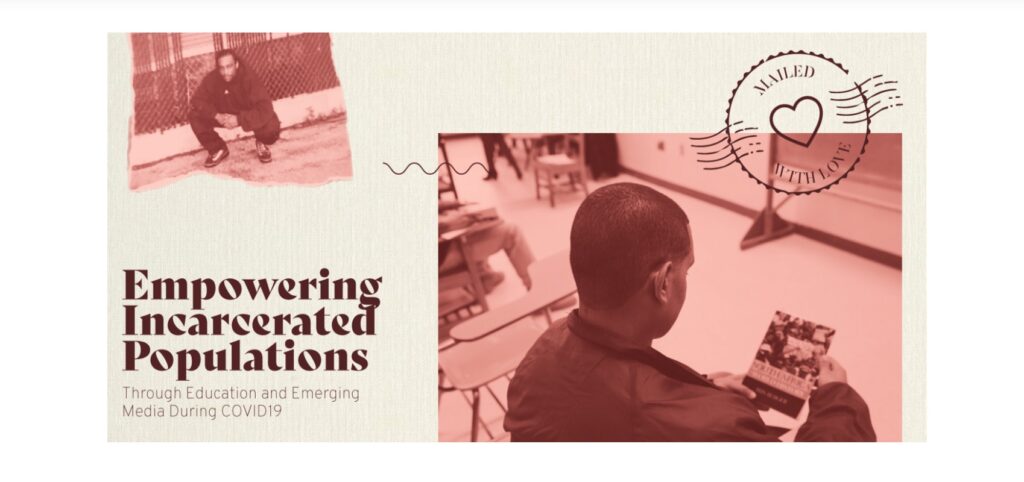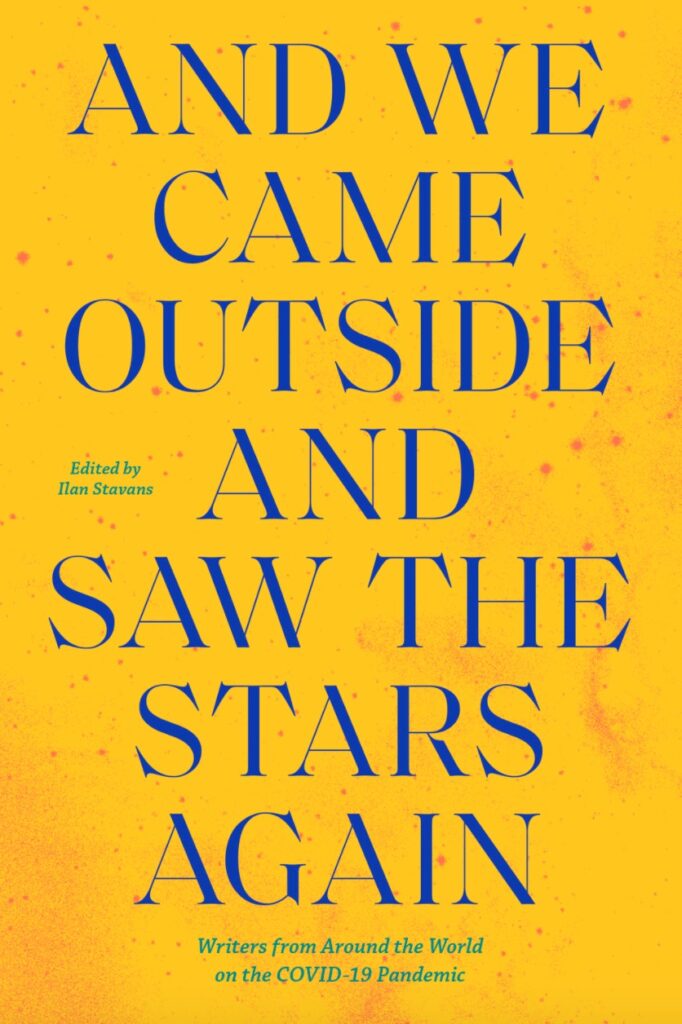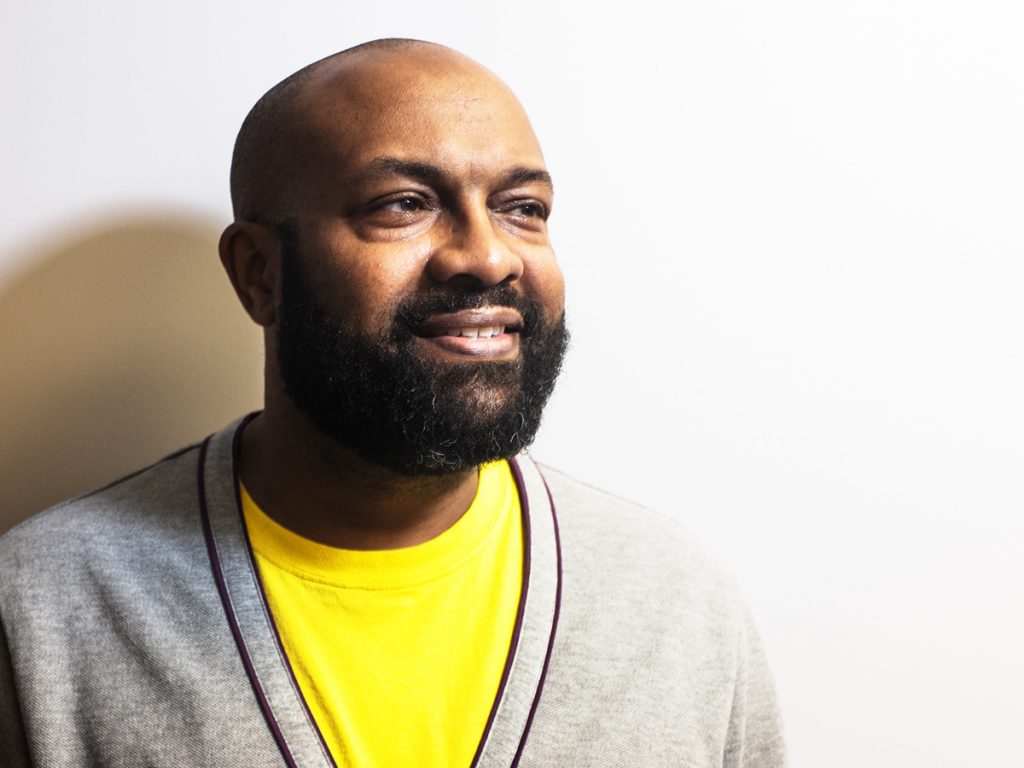Emerson Faculty Deploy Scholarship, Creativity in Tackling COVID-19, Racial Injustice
This year, as the world has confronted the double pandemics of COVID-19 and racial injustice, Emerson faculty members have been using their academic and professional expertise and creative energies, to help others make sense of the crises.
Emerson’s Office of Research and Creative Scholarship (ORCS) has gathered together examples of faculty research, writing, artistic work, classroom projects, and media engagements around the impact of the coronavirus, police brutality, and social change. The work originates from nearly every department and institute on campus, and has continued through the summer.
Here’s a sampling of the more than 65 examples ORCS compiled:

On COVID-19:
Journalist-in-Residence Lina Marie Giraldo asked both undergraduate and graduate students in her Data Visualization classes to report on the pandemic and its wide-reaching fallout using charts, graphs, and digital graphics that bring the numbers home to readers. Examples include “The Effectiveness of ‘Stay-at-Home’ Orders During the COVID-19 Pandemic”, “Reading Between the Unemployment Lines,” and “Charlie Baker and His Popularity During the Pandemic.”
Vincent Raynauld, associate professor of Communication Studies, co-authored with Mireille Lalancette of the University of Quebec at Trois-Rivières articles on political leadership and the coronavirus, including “How Political Leaders in North America Have Used COVID-19 to Improve their Polls,” published in Canadian journal Policy Options (Options Politiques) on May 6; and “Infection of Populism in the United States,” published July 1 in France Forum, the journal of Institut Jean Lecanuet.
Marketing Communication Professor Thomas Vogel and graduate students in his Design as Communication class created a game-based e-learning platform for high school students learning remotely “by applying design thinking into the Google sprint methodology.” City Builders would award students virtual “bricks” that they collect in order to construct “buildings,” allowing them to track their progress. Students would also be able to trade bricks by exchanging knowledge or skills.
Mneesha Gellman, associate professor of political science in the Marlboro Institute of Liberal Arts and Interdisciplinary Studies and director of the Emerson Prison Initiative (EPI), and Visual and Media Arts Assistant Professor Rashin Fahandej, an Engagement Lab fellow, were challenged to find new ways to support incarcerated populations both on the inside (Gellman) and after release (Fahandej).
With the pandemic preventing Emerson faculty from teaching EPI students inside MCI-Concord, Gellman and her EPI colleagues and students have had to reimagine how to build an intellectual community with neither in-class instruction, nor Zoom meetings (MCI-Concord is a no-Internet prison). EPI students designated facilitators and note-takers from among themselves, and assignments were submitted and evaluated through the mail.
Fahandej taught a partnered studio that brought Emerson students, federal probation officers, and formerly incarcerated fathers together to explore questions of masculinity and fatherhood. The original concept of a virtual reality (VR) pivoted to an augmented reality (AR) project, focused on creating postcards with a QR code that would activate videos, photos, and audio messages recorded by fathers and probation officers. Many participants believed that the AR format allowed for more honesty than the original VR concept would have.
While in quarantine, Performing Arts Senior Distinguished Artist-in-Residence Scott Wheeler composed “Isolation Rag,” and was surprised to hear it premiered by violinist Gil Shaham during the Music Never Sleeps Dresden Music Festival, a 24-hour livestream festival on May 16. You can hear Shaham perform “Isolation Rag” on Violinist.com.
In early June, Emerson Contemporary’s Distinguished Curator-in-Residence Leonie Bradbury spoke on a virtual panel on “Art and Digital Technology in a Time of Crisis,” hosted by the Moore Institute for Research in the Humanities and Social Studies at National University of Ireland, Galway. Bradbury joined panelists from NUI Galway and Technological University Dublin to discuss how the pandemic informs and shapes digital engagement.

Tulasi Srinivas, professor of sociology and anthropology in the Marlboro Institute, published a piece on The Conversation on June 15 demonstrating ways “India’s Goddesses of Contagion Provide Protection in the Pandemic.” From the article: “Hindus in India have had a helping hand – several in fact – when it comes to fighting deadly contagions like COVID-19: multi-armed goddesses co-opted to help contain and kill pestilence. Collectively known as ‘Amman,’ or the Divine Mother, the goddesses of contagion – and it is always goddesses, not gods – have been called on for their services before.”
A number of Writing, Literature and Publishing faculty have essays including in upcoming anthologies. Assistant Professor Rajiv Mohabir’s piece, “An Area of Critical Concern,” is included in And We Came Outside and Saw the Stars Again: Writers from Around the World on the COVID-19 Pandemic, due out August 25 from Restless Books; and Professor Steve Yarbrough and Senior Writer-in-Residence Lise Haines each have essays in Alone Together: Grief, and Comfort in the Time of COVID-19, due out September 1 from Central Avenue Publishing.
On Police Brutality, Racial Justice, and Social Change
Emerson Polling, led by Spencer Kimball, assistant professor of political communication, has been conducting polls on all the most pressing issues of the time – the 2020 election, COVID-19, and police brutality/racial injustice, with respected news organizations like NPR, FiveThirtyEight, and USA Today picking them up. In early June, USA Today reported on the results of Emerson’s poll showing that a majority of Americans disapproved of Trump’s response to the murder of George Floyd by police in Minneapolis and the ensuing street protests.
On June 10, WBUR’s Modern Love podcast featured actress Lorraine Toussaint reading WLP Associate Professor and Graduate Program Director Kim McLarin’s 2006 essay, “Race Wasn’t an Issue to Him, Which Was an Issue to Me,” originally published in The New York Times’ Modern Love column.
Marlboro Institute Associate Professor Nigel Gibson published a piece, “Combat Breathing: The Spirit of Rebellion in the U.S.,” in South African social justice magazine New Frame on June 5. The article draws a connection between the Black Lives Matter movement in the U.S. and psychiatrist and philosopher Frantz Fanon’s concept of suffocation under colonial occupation. From the article, “Fanon’s words about life in colonial Algeria, written 60 years ago, have an uncanny resonance with black life in America’s cities. ‘There is not occupation of territory, on the one hand, and independence of persons on the other.’ Under these conditions, he says, ‘the individual’s breathing is an observed, an occupied breathing. It is a combat breathing.’”

Business of Creative Enterprises Director and Executive-in-Residence Wes Jackson talked to CNN in June for their story, “This is Pop Culture’s Moment of Reckoning on Matters of Race.” Speaking about rampant racism in vintage pop culture artifacts and media companies’ efforts to publish disclaimers while offering them, Jackson, co-founder of the Brooklyn Hip-Hop Festival, said they belong on history’s dust heap. “Get Dumbo off Disney Plus. I don’t want to see any more Little Rascals. A teachable moment? You’ve been able to teach this moment for 500 years, and you haven’t. So I want it gone. It’s insulting to me.”
And WLP Associate Professor and Elma Lewis Distinguished Fellow Jabari Asim, whose latest book, Stop and Frisk: American Poems, was published by Bloomsday Literary earlier this summer, spoke to a number of media outlets about issues around race and police brutality. On May 28, Asim talked to WGBH about protests in Minneapolis following the murder of George Floyd, on June 4 he contributed to Boston Magazine’s feature on “Books About Race, Power and the Black Experience,” he talked to NBC Boston on June 7 about the need to demilitarize police forces, and on June 22 he shared his picks for “children’s books that tell the story of race in America” with WBUR.
Categories